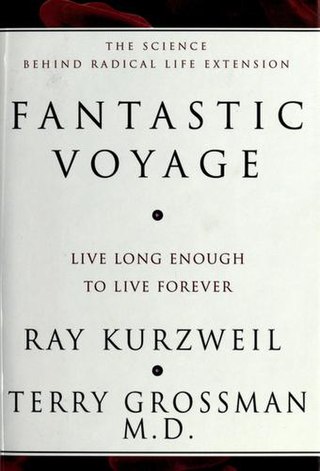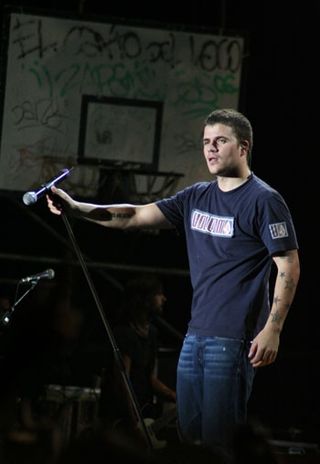
Aubrey David Nicholas Jasper de Grey is an English biomedical gerontologist. He is the author of The Mitochondrial Free Radical Theory of Aging (1999) and co-author of Ending Aging (2007). De Grey is known for his view that medical technology may enable human beings alive today not to die from age-related causes. As an amateur mathematician, he has contributed to the study of the Hadwiger–Nelson problem in geometric graph theory, making the first progress on the problem in over 60 years.
Strategies for engineered negligible senescence (SENS) is a range of proposed regenerative medical therapies, either planned or currently in development, for the periodic repair of all age-related damage to human tissue. These therapies have the ultimate aim of maintaining a state of negligible senescence in patients and postponing age-associated disease. SENS was first defined by British biogerontologist Aubrey de Grey. Many mainstream scientists believe that it is a fringe theory. De Grey later highlighted similarities and differences of SENS to subsequent categorization systems of the biology of aging, such as the highly influential Hallmarks of Aging published in 2013.

Fantastic Voyage: Live Long Enough to Live Forever is a book authored by Ray Kurzweil and Terry Grossman published in 2004. The basic premise of the book is that if middle aged people can live long enough, until approximately 120 years, they will be able to live forever—as humanity overcomes all diseases and old age itself. This might also be considered a break-even scenario where developments made during a year increase life expectancy by more than one year. Biogerontologist Aubrey de Grey called this the "Longevity escape velocity" in a 2005 TED talk.

Arielle Dombasle is an American-born French singer, actress, director and model. Her breakthrough roles were in Éric Rohmer's Pauline at the Beach (1983) and Alain Robbe-Grillet's The Blue Villa (1995). She has worked with a wide variety of filmmakers, including Werner Schroeter on Two (2002), Philippe de Broca on Amazon (2000), Roman Polanski on Tess (1979), Jean-Pierre Mocky on Crédit pour tous (2011) and Raoul Ruiz on Savage Souls (2001). She also starred in the 1984 ABC miniseries Lace and its 1985 sequel Lace II and appeared as a guest on Miami Vice. Dombasle has released thirty-four singles and eleven albums and has directed six movies.
Rejuvenation is a medical discipline focused on the practical reversal of the aging process.

Jessé Gomes da Silva Filho, known professionally as Zeca Pagodinho, is a Brazilian singer-songwriter working in the genres of samba and pagode.
Following is a list of topics related to life extension:

Daniel Martín García is a Spanish singer. He was the vocalist of the pop punk band El Canto del Loco (ECDL).

Rejuvenation Research is a bimonthly peer-reviewed scientific journal published by Mary Ann Liebert that covers research on rejuvenation and biogerontology. The journal was established in 1998. The current acting editor-in-chief is Ben Zealley. It is the official journal of the European Society of Preventive, Regenerative and Anti-Aging Medicine as well as PYRAMED: World Federation and World Institute of Preventive & Regenerative Medicine.
The following outline is provided as an overview of and topical guide to life extension:

In the life extension movement, longevity escape velocity (LEV), actuarial escape velocity or biological escape velocity is a hypothetical situation in which one's remaining life expectancy is extended longer than the time that is passing. For example, in a given year in which longevity escape velocity would be maintained, medical advances would increase people's remaining life expectancy more than the year that just went by.

The Methuselah Foundation is an American-based global non-profit organization based in Springfield, Virginia, with a declared mission to "make 90 the new 50 by 2030" by supporting tissue engineering and regenerative medicine therapies. The organization was originally incorporated by David Gobel in 2001 as the Performance Prize Society, a name inspired by the British government’s Longitude Act, which offered monetary rewards for anyone who could devise a portable, practical solution for determining a ship's longitude.
Pro-aging trance, also known as pro-aging edifice, is a term coined by British author and biomedical gerontologist Aubrey de Grey to describe the broadly positive and fatalistic attitude toward aging in society.
The SENS Research Foundation is a non-profit organization that does research programs and public relations work for the application of regenerative medicine to aging. It was founded in 2009, located in Mountain View, California, US. The organization publishes its reports annually.
How to Live Forever is a 2009 documentary film about longevity, written by Mark Wexler and Robert DeMaio. It is also directed by Wexler, and the film follows him on a three-year pilgrimage to discover the best practices and philosophies to help mitigate "the uncool trappings of old age." With the death of his mother and the arrival of an AARP card, Wexler begins to wonder if one can truly achieve immortality. He interviews an eclectic group of celebrities, health care professionals, centenarians, followers of Laughter Yoga, and scientists contemplating technology’s impact on the average lifespan in an attempt to conquer death.

Maria Entraigues-Abramson is an Argentine-American singer, composer, and actress, and is the Director of Development for the SENS Research Foundation.

Alexandre Kalache is a medical epidemiologist specializing in the study of aging. Since 2012 he is President of the International Longevity Centre-Brazil and since 2015 co-President of the Global Alliance of International Longevity Centres (ILC-GA). He formerly directed the World Health Organization global ageing programme at its Geneva headquarters following an academic career largely at the Universities of London and Oxford in the United Kingdom. Kalache has researched, written and spoken in the field of ageing issues as an academic, an international civil servant and an advocate.

Jordi Sánchez Zaragoza is a Spanish actor and screenwriter, mostly known for his role as Antonio Recio in La que se avecina and Josep Lopes in Plats bruts. He got a Certificate of Advanced Study on nursing at the Universidad Autónoma de Barcelona.
The Lifespan Extension Advocacy Foundation (LEAF) also known as Lifespan.io is a non-profit organization with mission to support fundamental research on the main mechanisms of aging and age-related diseases and educate the public on the possibility of bringing aging under medical control in order to prevent, postpone and cure age-related diseases. It was founded in 2014 and is based in New York City, New York, USA.

Félix Gómez is a Spanish actor. He earned early success in Spain in the early 2000s for his performance in the television series Al salir de clase. He is also known for his performances in Amar en tiempos revueltos, 14 de abril. La República and High Seas.












